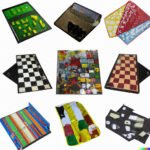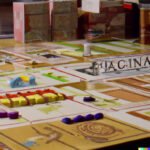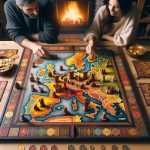The tradition of playing board games dates back centuries, and a variety of classic European board games have emerged to stand the test of time. Many board classics originate from different countries and offer diverse formats for engaging in game play. Traditional styles of strategy games can involve concentration or luck.
The Game of Life was invented by John Milton Bradley in 1860 and has become an unstoppable classic. This game is a simulation of life, and players take the role of one person’s life journey as they progress through life’s stages. Today, The Game Of Life is available in multiple versions, with each one allowing more opportunities to explore potential paths in life.
Checkers originated in Europe during the 11th century and survived the ages as one of the oldest classic European board games still played today. It is played on an 8×8 squared grid where opponents try to out-maneuver each other by capturing their opponent’s pieces until no more moves are possible or no pieces are left for one side.
The simplicity of this game is what makes it so timeless; requiring minimal setup, it has become an international favorite among generations both young and old.
Risk was originally released in 1959 as ‘La Conquête du Monde’ (“The Conquest Of The World”). Risk requires players to strategize their moves carefully while being prepared to adjust according to chance-based dice rolls.
Negotiation skills also come into play when forming alliances with other players or bartered trades occur between them using resources such as armies or regions under attack control. Risk tests a player’s foresight into consequences combined with reaction speed which makes it extremely popular worldwide.
These best classic European board games have become intertwined with international culture throughout the centuries with captivating legends about its beginnings and stories that pass down generations reminiscing over epic moments on the game boards. Each holds its own appeal – either for strategic thinking, luck, skillful communication or simply wanting some quality time together with family or friends. For sure – many hours have been spent playing these beloved classics creating iconic memories over and around Europe.
Chess
Chess is one of the oldest and most revered board games in Europe. Originating from India, the game of chess has been around since at least 600 AD. No other game has been as influential in shaping European culture and popularizing strategic thinking like chess.
It debuted in Europe during the 10th century as a result of early trade between India and Persia. It is thought to have evolved even further shape its modern form over time, incorporating various elements that would appeal to Europeans such as knights, royalty and castles which are still present today in older sets.
The Ever-Popular Backgammon
Backgammon is another classic European board game, widely enjoyed by people of all ages throughout the continent. While it’s unclear when exactly it first appeared in history, those tracing it back believe it almost certainly dates to ancient Mesopotamia around 5,000 BC; making it one of the oldest recorded board games ever played.
Although much simpler than Chess, Backgammon really came into its own among Europeans during the early Middle Ages and began slowly gathering steam around 1500 AD where it became a staple competitive ‘game night’ activity. Over centuries this game has gained more localization flavors ranging from Turkish Tavla to English Tables, with customizable board surfaces and rules all depending on which country you find yourself playing it.
A New Twist on an Old Favourite: Boggle
Boggle is yet another popular classic European board game that’s perfect for fans of word scramble puzzles. The original version made its debut in England way back in 1972 but was changed shortly thereafter due to licensing issues.
However, French toy maker who couldn’t ignore marvels brought to them by this darling puzzle managed to bring it back with some modifications meant to make play simpler and faster than before. This interesting economic twist combined with how we now have various editions available like Boggle Junior or Bitty Boggle means continuing relevance among young adults particularly who use their computer-equipped phones or tablets for running digital versions all day long.
Notable Features of Classic Board Games
- Strategic Thinkers: Chess is renowned for being the ultimate strategic thinker’s board game; requiring deep thought and analysis.
- Timeless Quality: From Mesopotamia onwards backgammon has proven itself age defying; giving rise to numerous localised variants over time.
- Versatility: Word scramblers can take heart too – boggle offers an exciting mix between old style play mixed with new updated versions.
- Customisation: Considering that different countries had specific cultural markers – one can also get customised sets of boards/rules.
Go
Go, originally Chinese weiqi, is one of the oldest board games still played. It has roots in ancient times and has been history’s longest continually-played game. With simple pieces yet deep strategies, Go has become a beloved classic in its own right.
Go is a two-player strategy board game that centers around placing pieces called ‘stones’ on a square 19×19 grid. Each player’s goal is to cover more territory than their opponent by building custom patterns. Players take alternating moves to place stones on the board; they may also choose to pass their turn if no suitable moves are available. The game’s elegant simplicity gave rise to various determining factors of victory:
- Occupying More Territory on The Board
- Incurring Fewer Lost Stones Than Your Opponent
- Enclosing Enemies And Avoiding Your Own Encirclement
The combination of minimal rules and complex strategies is what makes Go an exciting and enduring classic for players all over the world. Valuing positional changes that open up possibilities for both sides instead of trying to overpower one another directly, keeps every game fresh with ample amounts of variation and surprises.
Just like chess, Go provides an entertaining yet challenging matchup between two people from any culture or location, regardless if one player has any experience with the game or not.
Backgammon
Backgammon is one of the oldest and most iconic classic European board games. Dating back centuries, it originated in the Middle Eastern countries, where it was played by various local cultures. It was a revered game by both the wealthy upper classes and commoners alike, and soon spread to Europe via trading ships. Today it’s especially popular in Greece, Turkey, Italy, and parts of Eastern Europe.
Despite its ancient roots, the modern version of Backgammon has changed very little over time. The objective remains the same: outsmart your opponent by shifting around pieces on a triangular board before they can do so. Every move is calculated carefully through strategic maneuvering and requires an intricate knowledge of mathematics that challenges players from all levels. There are even variations available for those looking to add difficulty or customize gameplay.
In addition to being incredibly fun, backgammon also provides players with a plethora of social benefits during game-play. It encourages positive social interaction as participants have to try to outwit their opponents while enjoying the subtle nuances of each player’s style and playing-style choices; something that simply isn’t possible when playing against AIs in online simulations or computer programs.
Trading witty remarks then bargaining for checker position makes this classic extremely enjoyable and stimulating at all levels – from novice amateur gamers up to masters tournaments.
Backgammon has been widely accepted around the world due to its straightforward rules whilst simultaneously providing infinite depth in layered strategy; allowing players an entirely new level of gaming experience that’s beyond any virtual simulation available today.
For those who cherish intellectual stimulation or would like an exciting mix of chance plus skills requirements in one package, backgammon is the perfect choice – offering hours upon hours of intriguing entertainment without getting stale or boring quickly; regardless if you’re competing against friends or challenging yourself head-to-head with other skilled opponents across the world.
Carcassonne
Carcassonne is a classic European board game that dates back to the year 2000. In this game, players build a city by laying tiles featuring cities, roads, and other features. The game is won when one player has the most points at the end of all the tiles being laid out. It’s an exciting and unpredictable strategy game that keeps you on your toes.
There are a variety of methods experienced players generally employ to win Carcassonne. The first of these techniques is referred to as ‘turtling’ or ‘locking up’. This involves creating tight clusters of cities and roads so that only limited access from competing players is possible; denying rivals more points for building further out in the open.
Making Connections
Another technique is to look for opportunities to connect as many sections together as possible, buying time and increasing your score at the same time. Making multiple connections between different parts of the map increases a player’s scoring potential while simultaneously shrinking their competitor’s options for making larger plays in the area.
For example, if two players are working around opposite sides of a tile, it would be beneficial for one to make a swift connection in order to limit their opponent’s available moves.
Taking Advantage Of Possibilities
Finally, Carcassonenveterans take full advantage of creating possibilities rather than just taking them when they arise. Experienced players will look ahead several moves and determine what kindof tiles can guarantee them access or deny opponents – even if their immediate move doesn’t quite get them there.
This allows them to utilize less advantageous pieces currently in play for minimal strategic impact on their endgame prospects, while denying more appealing tiles from rival players seeking greater points and control over larger sections of the map.
Settlers of Catan
The Settlers of Catan, originally released by German game designer Klaus Teuber in 1995 is an incredibly popular strategy board game. It’s set on a fictional island named Catan which players attempt to colonize.
Players take on the role of settlers and build settlements, cities, and roads while navigating clever trade agreements to gain resources such as wood, sheep, brick and grain. By accumulating 10 victory points through building developments or establishing longest roads and largest armies the player is crowned the winner.
Game Play
At the beginning of each turn players are allowed to buy development cards such as knights which allow for protection from robber attacks, harvest cards which offer resource pieces of wheat, wood, brick and/or sheep when certain terrain hexes are rolled with a die. Trade ports also get you extra resources whenever they are rolled for.
The interaction between players requires great strategy since anything can happen when trading resources with other players. Every settlement or road must be contiguous with another so spatial awareness is key when plotting your path to victory.
Availability
A host of popular editions have evolved over time from big boxes to travel versions and even family variant editions that can accommodate up 5-6 people. Thematic additions have been made available such as art deco Mega Catan boards as well as books that give gamers the opportunity to go even deeper into the world of Catan.
Expansion sets are also available with seafarer’s adding pirate ships along with additional islands and scenarios like “The Fishermen of Catan” adding more variability making this a game for anyone who loves strategy games like Carcassonne or Ticket To Ride but also ready for something new in its own unique way.
Games of the Argentinian Gauchos
The idea of classic European board games began many centuries ago and while the concept has evolved over time, the essence of them remains solidly embedded in the cultural heritage of Europe. These beloved pastimes originate from traditions which have been passed down from generations past.
The Argentinian gauchos were among those to transport these traditions overseas to countries such as Argentina and Peru. It has been said that when they emigrated, they took with them their traditional board games so as to not forget the cultural practices they had grown up with back in Spain or Italy.
Today, it’s still possible to enjoy these old-fashioned entertaining activities by playing some of the best classic European board games. Here’s a list:
- Parchís
- Tute
- Mus
- Cacho (Card Game)
- Brisca
- Monopoly
Parchís, also known as Parcheesi in other places, is one of the oldest board games from Spain which dates back to 1100 AD. The objective is quite simple but still requires strategy; the aim is basically to move all four pawns across the board and into their respective home corner. To win, all four pieces must be entirely within the home area and no other pieces can be blocking their route.
Tute originates from Italy and was thought to have been brought to Argentina by Italian immigrants at some point in history. Tute involves two decks of cards and two players competing against each other in pairs; each player’s goal is simply to collect more points than his opponent during rounds of play compared with strategy or running away like Parchis does for example.
Although this game can be fast-paced at times too depending on how skilful each player is in their technique when handling their cards.
Mus is another classic European game that originated from Spain and although Argeninans simplified its original version somewhat now it involves 4 players who team up and battle head-to-head through rounds full of bidding & bluffing play during each hand dealt out by a deck containing 40 cards (7 Jacks & 33 figures).
Mus aim simply is; “the highest bidder wins” during any given round which must then shoulder all points scored between competitors during all hands played throughout that same round ensuring both skill & luck really come into play here too forming unique dynamic every single time when challenging your friends at this strategy card game.
Eurogames
Since the dawn of civilization, board games played an important role in communities all throughout Europe. But, since the late 1970s, a new breed of tile – and card-driven board games have become some of the most popular entertainment choices in Europe, and elsewhere. These are called mainly Eurogames or German-style board games. Such games originated from Germany but remain popular across other European countries.
Eurogames emphasize social interaction and negotiation between their players rather than competition and conflict. They are designed as simulations of real life events such as finance, colonization of lands, politics, or warfare. Usually they require minimal luck but careful strategic planning as well as cooperation and negotiation skills. In addition to providing important lessons on planning and strategy to children and adults alike, these games make for educational activities that can be played in family/friend gatherings.
Travel Through Time With The Settlers Of Catan
The Settlers of Catan is probably one of the worlds’ most well known German-style board game which was released in 1995 ENGLISH SEEMS OUT OF PLACE IN A GERMAN GAME (edit). Players assume the roles of settlers who build settlements to harvest resources while competing against each other for dominance over a vast network of islands.
It blends strategy with luck as players strategically utilize resource cards obtained through trading with each other to construct roads, cities, and improvements within their own domains.
The gameplay is fast paced and simple but requires considerable forethought it terms for efficient development goals along with adapting various strategies when being interacted with by fellow players or affected by game twists and turns created by chance elements provided by game dice rolls. The Settlers of Catan is published in 30 different language editions all around the world making it internationally available to a larger audience outside Germany as well.
Agricola: Build Your Own Farmland Empire
Agricola is another exciting table top strategy game set in pre-industrial times where players cultivate land much like real farmers do back in those days while caring for their own families’ welfare at the same time(rephrase?). Children are added later on as part of family members demanding food which means more challenges arise when managing all farm operations alongside domestic life commitments.
This make Agricola particularly pleasant yet challenging experience providing fun dialogues during mind processing sessions trying to evaluate best outcomes gained from decisions taken (Avoid phrase: ”shoot from hip”)
Players initially start with two characters representing themselves which then must gather resources throughout 4 seasons with purpose expanding bread farming business gradually from establishing first plots up until running productive cattle ranches finally leading into winning conditions established at the start upon completion.
Lack in flexibility increases difficulty coexisting due to precarious everchanging situations created since portions fields must be plowed efficiently side along side managing labor force adequatedly located around estate properly avoiding issues due constant backtracking amongst uneven terrain overall ending up using valuable time not managed rightly, so few steps ahead forecasting turns out really helpful.
Online Board Games
Board games provide hours of family fun and enjoyment. In today’s modern era, the most popular board games have been reimagined online. There are now a range of classic European board games that can be enjoyed from the comfort of one’s own home.
From logic-based strategy to chance-based luck, these classic games offer different levels of challenge for all ages. Here is a list of some of the best classic European board games that you can play online:
- Risk – The original game requires you to capture territories by moving your pieces across an imaginary map.
- Chess – As one of the oldest board games, it involves both players’ moves strategically around a checkerboard battlefield.
- Monopoly – The aim is for each player to create their own network of property empire in order to become the wealthiest in the game.
- Settlers of Catan – This is a strategic placement game with resource management elements where players build settlements and roads using various resources throughout the game’s islands.
- Mancala – Mancala is an abstract strategy board game whichcan vary from region to region but uses stones and cup holes in its play.
These classic European board games have grown in popularity over time due to their timeless appeal and entertainment value. Players can find opportunities online to play against friends or experience face-to-face tournaments as they work towards becoming champion champions in any style or variation chosen.
Furthermore, since these titles are so well known, many experienced gamers also regularly stream their plays on platforms such as Twitch and YouTube which provides entertaining spectating options as well additional information about strategies which may help new players become better acquainted with the rules.
Many versions provide bonus content such as additional computerized AI characters who help teach beginners how each rule works and challenge expert level gamers at higher levels than before. These digital adaptations feature 3D animation, sound effects and more for an immersive gaming experience as if they were playing in front of fellow human opponents.
Other notable features up for grabs online include worldwide leader boards where participants compete for prizes or simply recognition among other participants within a community environment which encourages mutual competition among peers with skillfully similar capabilities.
Conclusion
Classic European board games not only provide hours of entertainment and the opportunity to develop strategies, but they also represent a rich cultural history. It is important to ensure these games survive for future generations of players to enjoy as much as those before them. They can teach us valuable lessons about cooperation and competitiveness within our society, inspire empathy, stimulate critical thinking skills, and build strong relationships through shared experiences.
With regular dedicated playtime, families can have serious fun engaging in imaginative scenarios without needing fancy or expensive equipment or technology. Collecting classic European board games and restoring them will help conserve them for the pleasure and enjoyment of future players.
When preserving classic European board games it’s important to have an appreciation for how each game is played by consulting the game instructions so that original rules are kept intact. It is essential that old boards don’t get damaged or lost from improper storage or ruthless wear-and-tear – as this will impact the authenticity of later plays.
Players should be gentle with pieces during use too – handling pieces respectfully allows them to last longer which can reduce reliance on replacements over time. Developing physical care techniques such as buying protective covers for boards and using velvet bags/materials to store pieces always helps maintain original parts integrity in the long run.
It is also possible to find great vintage editions online through secondhand resellers or hobbyist collectives – usually offering cards, maps, pieces, boxes, replacements tiles etc., that are sought after by passionate devotees of these fantastic classics. Through upcycling/recycling vintage materials found at flea markets or estate sales it is possible to develop creative refinishing strategies which will rejuvenate classic European board games from ruin – saving them from being forgotten completely.
Finally although not many different versions exist today compared to how it was years ago – when you find a special popular edition you may have discovered an undiscovered gem worth keeping alive.

I love playing all kinds of games – from classics like Monopoly to modern favourites like Ticket to Ride.
I created this blog as a way to share my love of board games with others, and provide information on the latest releases and news in the industry.





